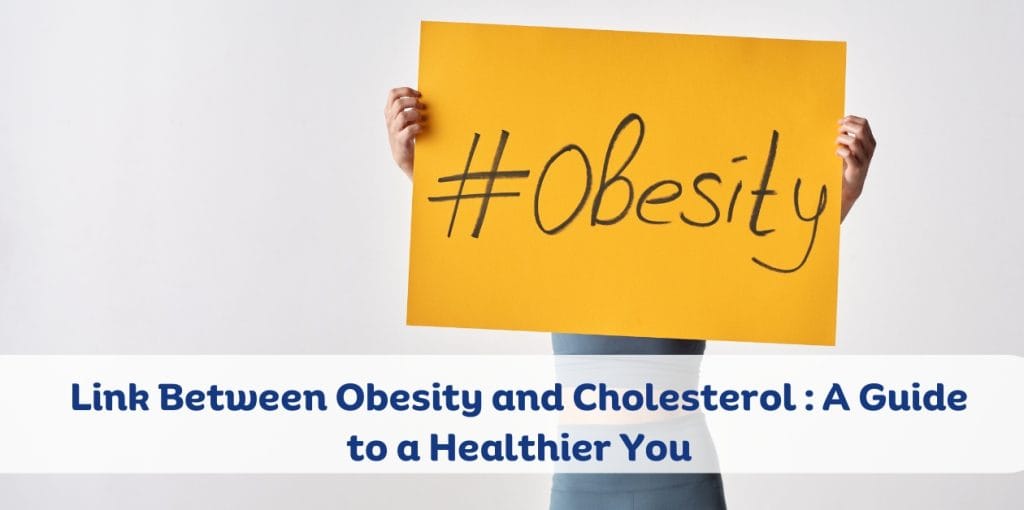Link Between Obesity and Cholesterol : A Guide to a Healthier You In 2025

Obesity and cholesterol are closely connected health concerns that affect millions globally. Individually, they increase the risk of heart disease, stroke, and type 2 diabetes. Together, they create a silent threat to your long-term well-being.
The good news? Both obesity and high cholesterol are manageable — and often reversible — through lifestyle changes, awareness, and medical guidance.
In this guide, we’ll explore the link between obesity and cholesterol, signs to watch for, and effective ways to take control of your health.
What Is Cholesterol and What Does It Do?
Cholesterol is a waxy, fat-like substance found in every cell of the body. It’s essential for many functions, such as:
- Building cell membranes
- Producing hormones like estrogen and testosterone
- Synthesizing vitamin D
- Creating bile acids that help digest fats
Silent But Serious: Symptoms of High Cholesterol
High cholesterol is often symptomless — which is why it’s referred to as a “silent” condition. Still, in some cases, you might notice:
- Chest pain or angina
- Fatigue or shortness of breath
- Xanthomas: yellowish fatty deposits under the skin, especially around eyes, elbows, or knees
- Weight gain or visible abdominal obesity
- Peripheral vascular disease
Because symptoms are rare, the only reliable way to detect high cholesterol is through a simple blood test.
The Strong Link Between Obesity and Cholesterol
The Strong Link Between Obesity and Cholesterol
There’s a direct and powerful connection between obesity and cholesterol levels. Obesity, especially around the abdomen, leads to an unhealthy lipid profile:
- Increased LDL (bad cholesterol)
- Decreased HDL (good cholesterol)
- Elevated triglycerides, another type of fat in the blood
This combination drastically raises your risk of cardiovascular disease and metabolic syndrome.
How to Manage Cholesterol and Combat Obesity
The most effective way to improve both obesity and cholesterol levels is through sustainable lifestyle changes. Here’s what you can do:
1. Healthy Eating Habits
- Add soluble fiber: oats, beans, apples, and citrus fruits
- Include healthy fats: avocados, olive oil, nuts, and fatty fish
- Reduce sugar and refined carbs
- Avoid trans fats and saturated fats: processed snacks, fried foods, and full-fat dairy
- Stay hydrated with water instead of sugary drink
2. Regular Physical Activity
- Aim for 30 minutes of moderate exercise (like brisk walking) at least 5 days a week
- Add strength training twice a week to build muscle and boost metabolism
3. Weight Management
- Losing just 5–10% of your body weight can significantly lower cholesterol
- Focus on long-term habits, not crash diet
4. Quit Smoking and Limit Alcohol
- Smoking lowers HDL (good cholesterol) and damages your blood vessels
- Quitting improves heart health almost immediately
- Reduce alcohol intake to support weight and cholesterol control
5. Prioritize Sleep and Manage Stress
- Get 7–9 hours of quality sleep every night
- Practice stress-relieving techniques: meditation, yoga, deep breathing, or journaling
Medical Treatments for High Cholesterol
When lifestyle changes aren’t enough, your doctor might recommend medications such as:
- Statins – lower LDL cholesterol
- Ezetimibe – reduces cholesterol absorption
- PCSK9 inhibitors – effective for genetic high cholesterol
- Bile acid sequestrants – help eliminate excess cholesterol
Always follow your doctor’s guidance and attend regular check-ups.
Conclusion: Your Health Is in Your Hands
Obesity and cholesterol may not cause immediate symptoms, but they can gradually damage your heart, blood vessels, and organs. Taking early, proactive steps can make all the difference.
Start small:
- Walk for 10 minutes after meals
- Choose grilled over fried foods
- Swap soda for water
These tiny shifts add up to massive gains over time.
Your body is your lifelong home. Treat it with care — and it will reward you with strength and vitality.
Don’t wait for symptoms to appear. Get your cholesterol checked and take the first step toward a healthier future today.
About Author
Dr. Y Swetha
MBBS , MD (General Medicine)
Dr. Y Swetha is a skilled physician currently practicing at PI Health Cancer Hospital. She holds an MBBS from Kamineni Institute of Medical Sciences and an MD in General Medicine from Prathima Institute of Medical Sciences.Dr. Swetha has extensive experience in outpatient, inpatient, emergency, and critical care settings. She is proficient in managing chronic conditions, critical emergencies, and advanced procedures such as ventilator management and catheter placements.

